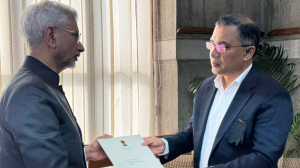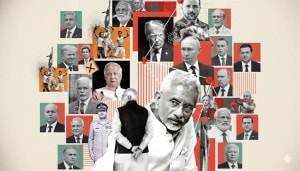Honest money
For once I am in agreement with Congress president Sonia Gandhi that during the NDA regime many jobs were lost. It would be more correct to ...

For once I am in agreement with Congress president Sonia Gandhi that during the NDA regime many jobs were lost. It would be more correct to say that these jobs simply disappeared. The Congress president has reason to bemoan these lost jobs. But first let us give her the marks for sympathising with those who have suffered from loss of these jobs.
One of these jobs was to 8216;8216;import8217;8217; gold. The Congress Government in its wisdom banned the bringing in of gold. However, the demand for gold, estimated to be about 500 tonnes annually, continued unabated. How was this demand met? Obviously, through smuggling. Gold smuggling thus flourished under the Congress regime. The NDA Government allowed gold to be imported openly, on payment of duty. This enabled jewellers to legitimately meet the demand for gold. Smuggling is now unprofitable. The difference between the domestic and international prices of gold has narrowed. Of course, the smugglers are now out of work.
How could the smuggler don pay for this 8216;8216;import8217;8217; of gold? The international syndicate that sold the gold obviously would not accept rupees. The payment had to be in dollars. Sonia should quiz her economic advisers on this. During the Congress regime, the rupee-dollar rate of exchange officially fixed by the government had no relation to its market price. That means, in the 8217;70s, you could buy a dollar in Indian banks for Rs 8 against the grey market price of about Rs 16. So all you had to do to earn a few rupees was buy dollars from a bank and sell them to those who were in need 8212; like those travelling abroad. They needed the extra bit because the government only allowed them to carry an extremely limited amount of dollars 8212; and that too after passing through a lot of red tape.
Every dollar you earned, either by exports or through remittance, could only be exchanged for rupees at the official rate. There arose a 8216;8216;network8217;8217; of people who would approach Indians getting remittance from their relatives. The 8216;8216;network8217;8217; offered them a higher exchange rate than the banks. All that was needed was for the recipients here to intimate their relations abroad that the dollars be paid to so-and-so agent. The transaction was entirely based on trust.
So a huge 8216;8216;industry8217;8217; flourished. Agents picked up dollars from abroad and paid the intended recipients here almost 50 per cent more than what the bank would have paid in rupees. The dollars that remained abroad were used to pay for smuggling of gold and other goods such as watches, cameras, electronics. The dollars were sold to needy Indian travellers, and also helped convert black money into white. This 8216;8216;network8217;8217; picked up rupees from India, transformed them into dollars to be stored abroad in numbered accounts in Swiss banks or in banks in small countries like Luxemburg where the rules were lax. Both in India and abroad, it employed thousands of agents to work behind a curtain of some legitimate business. And now they are all jobless!
The economic reforms have also rendered jobless several other 8216;8216;rentiers8217;8217;, as economist Ricardo dubbed the class that lives on other people8217;s honest efforts. These people who lost their jobs were the liaison men and women who frequented Udyog Bhavan and other such government offices. They were needed to get thousands of industries8217; permits to import components and machinery, licenses to manufacture various things, clearances for foreign collaboration and a host of other papers from the government agencies.
During the Congress regime one needed a license to manufacture anything, from yarn to cement. The license would also specify the capacity. If import of any raw material or component was involved, you had to get another license and renew it every year. If it involved foreign collaboration, a clearance that an indigenous technology was not available. Industrialists had to make repeated visits to Delhi to get the papers moving and grease the wheels of the administration. An army of liaison officers was employed to ensure these wheels were well-oiled. With the removal of all these permits and licenses, this entire army is without job!
Touts were needed even to get a telephone connection, with a waiting list of three million or more. Similar was the fate of applicants for cooking gas connections. There are no more queues for cooking gas and private parties are permitted to supply it. The waiting list for telephones has also disappeared. Much of government information is available online and is increasingly freely accessible for all, in a deliberate move to make the government more transparent. Have not these developments displaced the touts?
Similarly there are hosts of other people who have been rendered jobless in the liberal economy that works more by market forces than by the decisions of officers who know nothing about business. The Congress Governments had spawned a host of so-called businessmen over the decades. They got permits and licenses and never produced a bit of material. These permits and licenses were sold under the table for a price. Sometimes these license-holders got paid for not implementing the license so that the existing manufacturers of the same item could enjoy a protected market.
The reason why the Congress president is worried for these people is because they made hefty contributions to her party8217;s coffers. True, the Mrs Gandhi of the 21st century may not have directly benefited like the Mrs Gandhi of the last century. The original Mrs Gandhi ensured that businessmen could not legally make payments to political parties 8212; thereby driving funding of political parties underground. During her regime, the Permit License Raj became ubiquitous and regressive as well as vindictive.
Under the NDA, this link stands destroyed. You don8217;t have to go to the Minister to set up an industry or import your needs. You don8217;t have to import completely manufactured item disguised as a sub-assembly and sell it in the grey market.
Through reduction of import duties and liberalisation of import procedures, the mafia of disguised importers has been dealt a deadly blow. Surely, all of them would find a champion of lost causes in Sonia, as her party itself is a lost party humiliated daily by upstarts like Mayawati and Laloo.
As the Grand Old Party goes knocking at the doors of local and caste satraps, the pool of black funds drying up, even the old cronies, the fattened bulls of the License Permit Raj, are not betting on its return to power. It is that 8216;8216;unemployment8217;8217; that seems to hurt Sonia and make her bemoan the days of glory of her once powerful party.
The writer is the convener of the BJP8217;s think tank
- 01
- 02
- 03
- 04
- 05































